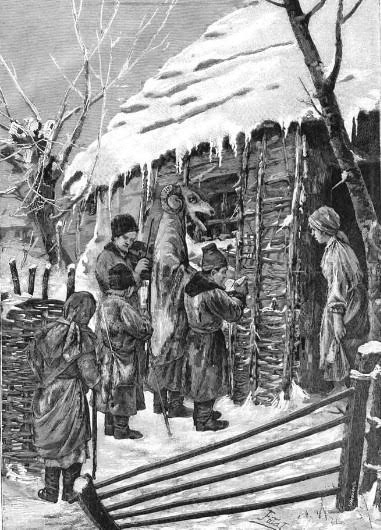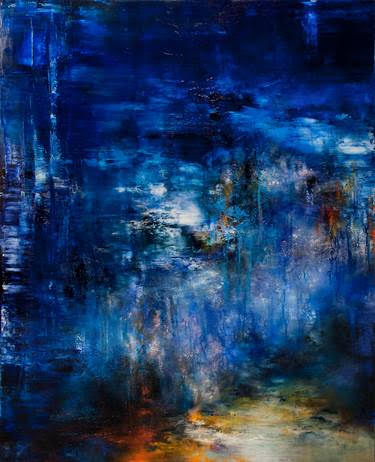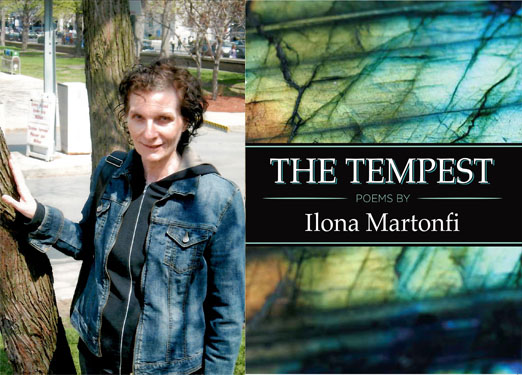In this Inanna blog Ilona Martonfi, author of The Tempest (Inanna 2022), introduces Climate Change. “BLEACHING” p. 72. Praise for The Tempest: Blurb by Louise Dupré. Elegy. The Unfolding Elegy: Anne Carson’s “Nox.” Koza (Коза: Goat) in Ukrainian: A Mimetic Folk Play. Ludovico Einaudi’s “Elegy for the Arctic” (Youtube). Arctic Cotton Grass. The Harp Seal. Sedna in Inuit Mythology. Joan Didion’s Blue Nights. Paradox. The Poetry of Autumn. Frost’s “After Apple-Picking”. Lastly, Offering a free verse “MY BROTHER’S ASHES ON PUGET SOUND” The Tempest p. 76. & Haiku for BUCHA.
Climate Change
“We have failed, somehow, to humanize this issue…. A good poem reminds us of our shared humanity. A good poem reminds us of everything we share and everything we put at risk. So why poems? Because they are the backbone of our culture, and that is what must change.”
–Poets.org Poems about Climate Change
Bleaching
[…]
name it wind, or cloud
the sixth extinction
splashed white by a mad artist
zooxanthellae, symbiotic algae
leaving a bare skeleton
Praise for The Tempest
“Nagasaki, Dachau, Chernobyl : Ilona Martonfi testifies to both terrible events in history as well as various moments in her past, such as her childhood after World War II, her sister’s and brother’s deaths, her travels in other countries. In this moving collection of poetry, love and hope stand up to pain and desolation. The “threads of memory” weaved in The Tempest reach us deeply with their intelligence and their sensibility.”
—Louise Dupré, poet and novelist
Elegy
“Elegy is formal poem of lamentation, usually about a death, or the symbolic passage of mankind.” Elegy – Wikipedia
The Unfolding Elegy
Anne Carson’s “Nox”
“Nox” is as much an artifact as a piece of writing. The contents arrive not between two covers but in a box. Inside is an accordion-style, full-colour reproduction of the notebook, which incorporates pasted-in photographs, poems, collages, paintings, and a letter Michael once wrote home, along with fragments typed by Carson. A mourner is always searching for traces of the lost one, and traces of that scrapbook’s physicality—bits of handwriting, stamps, stains—add testimonial force: this person existed.
Despite the inclusion of personal details, “Nox” (Latin for “night”) is as much an attempt to make sense of the human impulse to mourn as it is a story about a lost sibling. In poem 101, Catullus writes:
Many the peoples many the oceans I
crossed—
I arrive at these poor, brother, burials
so I could give you the last gift owed to
death
and talk (why?) with mute ash.
The Unfolding Elegy | Dan Chiasson
https://www.nybooks.com › Articles
Koza
Koza (Коза: Goat) in Ukrainian

Koza Christmas play (1883 drawing)
Koza – Internet Encyclopedia of Ukraine
http://www.encyclopediaofukraine.com
A Mimetic Folk Play
Koza (Коза; Goat). A traditional mimetic folk play that was acted out during the Christmas cycle by young men, who visited all the houses in a village. The Goat—a youth wearing an inverted sheepskin coat and a mask resembling a goat’s head—entered a house, bowed to the head of the household, and performed a ritual dance to bring about an abundant harvest. The other youths sang an accompanying ditty: ‘De Koza khodyt’, tam zhyto rodyt’, de Koza tup-tup, tam zhyta sim kup’ (Where the Goat goes, there wheat grows; where the Goat stamps its feet, there are seven sheaves of wheat).
Ludovico Einaudi’s “Elegy for the Arctic” (Youtube)
https://youtu.be/2DLnhdnSUVs
Love Song To Our Planet: The silence broken by the noise of the glacier as it fell off. Some notes torn from a grand piano floating in a sea of ice. Thus began the video with which master Ludovico Einaudi put the soundtrack to the campaign to save the Arctic. It was recorded in Svalbard, in the Norwegian Arctic, just a year ago and managed to bring the thawing problem closer to millions of people around the world. Discover how one of the most magical moments was built in this campaign that seeks to protect one of the most threatened corners of the planet and on which we all depend.
Arctic Cotton Grass
Arctic Cotton Grass: One of the most important plants in the Inuit culture, the Arctic Cotton Grass blooms mid-summer, and grows in the wetter areas and swampy grounds. Once used by the Inuit as a candle wick, the cotton grass was collected, dried, and rolled to mix with seal fat in winter seal lamps. This combination of seal fat and the cotton grass wick produced a small flame, just enough to warm an igloo. In areas where caribou were in abundance, the cotton grass wick was used in combination with caribou fat to produce a candle.
–Courtesy of Arctic Watch Wilderness Lodge via Travel Nunavut
The Harp Seal
The harp seal, medium-sized, greyish earless seal possessing a black harp-shaped or saddle-shaped marking on its back, native to the northernmost Atlantic Ocean and Arctic Ocean. In Greek, its scientific name translates to “ice-lover from Greenland,” and its taxonomic synonym, Phoca groenlandica translates to “Greenlandic seal.”
— Harp seal – Wikipedia
https://en.wikipedia.org › wiki › Harp_seal
Sedna in Inuit Mythology
Sedna (Inuktitut: ᓴᓐᓇ is the goddess of the sea and marine animals in Inuit mythology, also known as the Mother of the Sea or Mistress of the Sea. The story of Sedna, which is a creation myth, describes how she came to rule over Adlivun, the Inuit underworld.
—
Sedna (mythology) – Wikipedia
https://en.wikipedia.org › wiki › Sedna_(mythology)
Blue Nights
“I found my mind turning increasingly the dwindling of the days, the inevitability of the fading, the dying of the brightness. Blue nights are the opposite of the dying of the brightness, but they are also its warning.”
―goodreads Joan Didion, Blue Nights

Blue Night Painting Link: SAATCHI ART. com Chris Veeneman Works
Paradox
A paradox is a figure of speech in which a statement appears to contradict itself. This type of statement can be described as paradoxical. A compressed paradox comprised of just a few words is called an oxymoron. This term comes from the Greek paradoxa, meaning “incredible, contrary to opinion or expectation.
The Poetry of Autumn
by Anne Finch
“The poetry of earth is never dead,” wrote John Keats.
Where does paradox find its proper home but in poetry, and in autumn? that balance between fecundity and decay which Frost addresses with such excruciating specificity in
“After Apple-Picking”:
Magnified apples appear and disappear,
Stem end and blossom end,
And every fleck of russet showing clear. . . .
I am overtired
Of the great harvest I myself desired.
This paradox, I think, is the pith of autumn, the part that some of us just can’t get enough of, the reason autumn is so many people’s favorite season. And in this, autumn is again like poetry: though it may help us to notice more deeply how we are alone, it can also help us to feel the excitement of sharing that solitude with each other. In the words of Basho,
it is deep autumn
my neighbour
how does he live, I wonder
Offering a Free Verse “My Brother’s Ashes on Puget Sound” published in The Tempest p. 76
[…]
a chaplain reading your name:
Martonfi, Joseph Frank (case #15-0971) Age 66,
Died June 4, 2015 in Tacoma
ringing a small bronze bell.
Is this your loved one?
Weren’t we here? And, you here too?
It’s a small space that boat
poetry for your absence.
Lastly, Haiku for Bucha Inspired by a Youtube Video https://youtu.be/t7S6nQbvcTw
In a heartbreaking video, a Ukrainian mother takes several minutes in her bombed-out home to perform one final song on her piano hours after Russian attacks. Irina Maniukina, 48, rushed to her family’s home in Bila Tserkva, Kyiv Oblast’s largest city, after discovering that her 16-year-old daughter Karina had survived a missile strikenear their home on 12 March 2022.
Bucha
in her bombed-out house
mother plays one final song
at her white piano
clutched
at a borrowed casket
the Full Moon
children painting
daffodils over bullet holes
Kyiv suburb Bucha
I conclude with Inanna Publications News
Pleased to see All Lit Up features my three Inanna poetry books, The Snow Kimono, Salt Bride & The Tempest on their site https://alllitup.ca/contributors/M/Martonfi-Ilona
The Tempest by Ilona Martonfi, Paperback | Barnes & Noble®
https://www.barnesandnoble.com › Books
Author bio: Ilona Martonfi is a Montreal poet born in Budapest. She is a writer, editor, creative writing teacher, and founder of the writing group, Rue Towers Writers. She is the author of the poetry books, Blue Poppy (2009), Black Grass (2012), The Snow Kimono (2015), and Salt Bride (2019), as well as seven chapbooks, Visiting the Ridge, Charivari, Magda, Adagio, Mud, Moth and Black Rain. Ilona is Founder and Literary Curator of The Yellow Door and Visual Arts Centre Reading Series and Argo Bookshop’s Reading Series. She is a recipient of the QWF 2010 Community Award. Ilona has published extensively in print and online literary publications. She was a Finalist for the 2007 Quebec Writing Competition. Her story, “My Daughter, Marisa,” was published in CBC Story Anthology III, In Other Words: New English Writing from Quebec (2008), and Ilona’s “Stories of Belonging” was shortlisted for Canada Writes in the adult category (2014). She was also a StepAway Magazine nominee for the 2018 Pushcart Prize for the poem “Dachau Visit on a Rainy Day”. The Tempest is her fifth poetry collection.

